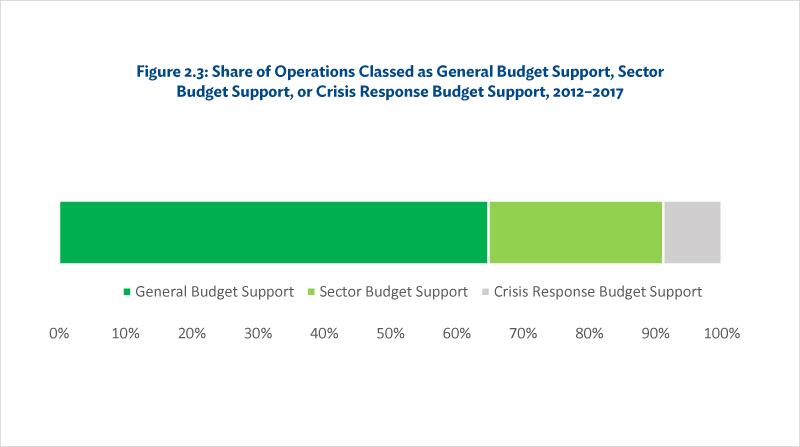Over the period 1999–2009, out of a total of 102 PBOs, only seven supported reforms in the energy, agriculture, social and financial sectors. Most PBOs were focused on PFM and on improving the business climate.
In line with the spirit of the 2012 policy, AfDB is making greater use of PBOs to support governance reforms in the health, energy, transport, and agriculture sectors in addition to its core work in economic and financial governance. Although about 65% of PBOs during the period were officially listed as GBS (Figure 2.3), the proportion of SBS increased over previous years. In addition, a closer look at the content of the PBOs reveals that 59% (whether listed as GBS, SBS or CRBS) included a focus on sector governance rather than concentrating on core economic governance areas such as PFM. This compares with 31% for the 2 years preceding the policy. At the same time, 75% of PBOs in the 2012–2017 periodalso included PFM components.

Notably, all PBOs can be mapped to at least one of AfDB’s “High 5s,”23Building on its existing 2013–2022 strategy, AfDB outlined five development priorities: Light up and Power Africa; Feed Africa; Industrialize Africa; Integrate Africa; and Improve the Quality of Life for the People of Africa. as identified in the Ten-Year Strategy and the Governance Strategy and Action Plan II (2014–2018), or supported governance issues which cut across them. The three High 5s that received the most support during the period were: (i) Industrialize Africa (mainly through private sector environment reforms); (ii) Quality of Life (including education and social protection); and, (iii) Light up and Power Africa (the fastest growing area with almost all PBOs approved in the last 3 years). AfDB’s New Deal on Energy in Africa highlights the importance of addressing deficiencies in country policy and regulatory frameworks. PBOs with a focus on helping governments to provide an environment conducive to doing business is relevant to AfDB’s existing governance and private sector development strategies as well as to the “Industrialize Africa” High 5.
During the Ebola outbreak of 2014, which was responsible for the deaths of 11,325 people in West Africa, the three countries most affected by the crisis (Guinea, Liberia and Sierra Leone) were characterized by weak links between government and society, inadequate governance, continued insecurity, and weak institutional capacity. Strengthening their recovery and response capacity was seen as vital to ensure early detection and avoid the outbreak expanding beyond the affected countries. The last case of Ebola was recorded in Guinea in June 2016. AfDB used the SBS instrument and was able to learn from its experience in managing a crisis, which subsequently enabled it to respond quickly and efficiently to the COVID-19 pandemic. Several lessons were drawn from the evaluation of the two projects, which made up part of AfDB’s response to the Ebola crisis:24AfDB. 2015. Technical Assistance to Support Countries (Guinea, Sierra Leone and Liberia). Abidjan; and AfDB. 2014. Strengthening West African Health Systems. Abidjan.
- Active community consultation, engagement, social mobilization and proper analysis of the social environment contribute to good project design.
- Including government officials as members of the project implementation units for large and complex projects is important.
- Operational flexibility in the design and implementation of the project can be helpful in meeting project objectives.
- Country ownership and empowerment of local organizations through community engagement and social mobilization are key for the success of any project that operates in the community.
- The lack of a unified regulatory framework is likely to hamper the deployment of volunteer health workers and other support mechanisms.
- Embedding capacity building as part of an emergency or crisis response that faces severe restrictions on movement and personal contacts does not work.
- The lack of a monitoring and evaluation officer for a project of this magnitude adversely affects smooth and efficient project delivery.
- 23Building on its existing 2013–2022 strategy, AfDB outlined five development priorities: Light up and Power Africa; Feed Africa; Industrialize Africa; Integrate Africa; and Improve the Quality of Life for the People of Africa.
- 24AfDB. 2015. Technical Assistance to Support Countries (Guinea, Sierra Leone and Liberia). Abidjan; and
AfDB. 2014. Strengthening West African Health Systems. Abidjan.
